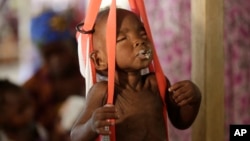Thousands of children have died of starvation and disease in Boko Haram-ravaged northeastern Nigeria, Doctors Without Borders said Tuesday quoting a new survey that is forcing Nigerian officials to stop denying the crisis.
The Paris-based organization hopes that official recognition of the calamity in which "thousands are dying every day" will help bring urgent aid before older children also start dying, Natalie Roberts, emergency program manager for northeast Nigeria, told The Associated Press.
A survey of two refugee camps in the northeastern city of Maiduguri shows a quarter of the expected population of under-5 children is missing, assumed dead, according to the organization. Northeastern Nigeria's under-5 mortality rates are more than double the threshold for declaring an emergency, Roberts said in a phone interview from Paris.
Speaking on her return from northeastern Borno state, the birthplace of Boko Haram's Islamic uprising, she said the absence of young children was striking.
"We only saw older brothers and sisters. No toddlers are straddling their big sisters' hips. No babies strapped to their mums' backs. It's as if they have just vanished," Roberts said.
Doctors Without Borders first sounded the alarm in June but Nigerian camp officials as late as September denied any child was suffering malnutrition. That was even after the Associated Press published images of matchstick-thin children fighting for their lives at Doctors Without Borders intensive feeding center in Maiduguri.
"The difference now is that our figures have been checked by the statistician general, and we have official recognition from the government that they believe this is happening," Roberts said.
An estimated 75,000 children could die within a year because donors have provided only one-third of requested funding and twice as much, $1 billion, is needed for the rest of the year and into 2017, says the United Nations.
A vital funding conference in Geneva next month could save the day, otherwise "it won't be long before we could be in the painful position of having to turn away sick and starving children," says the U.S.-based Save the Children.
Some 2.6 million people including more than 1 million children have been driven from their homes by Nigeria's 7-year-old insurgency that has killed more than 20,000 people, left food-producing fields fallow, disrupted trade routes and destroyed wells, bridges and entire towns.
The crisis is aggravated by alleged theft of food aid being investigated by Nigeria's senate.
President Muhammadu Buhari last month set up a presidential committee to coordinate aid and the rebuilding of the northeast, even as an end to the rainy season has brought a predictable upsurge in attacks on military outposts and urban suicide bombings by the Islamic extremists.
New MSF Survey: Thousands of Kids Dying in Northeast Nigeria

LAGOS, NIGERIA —







